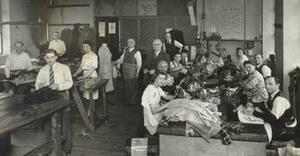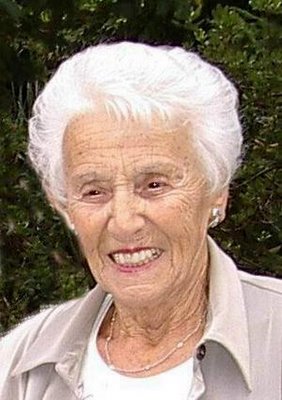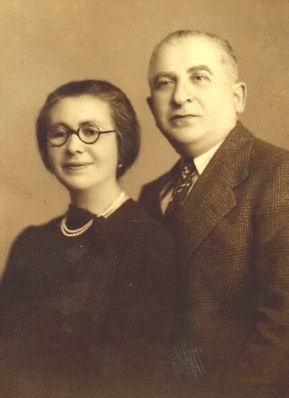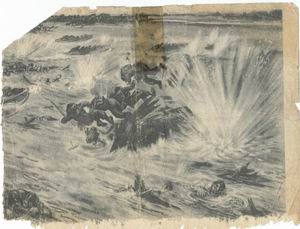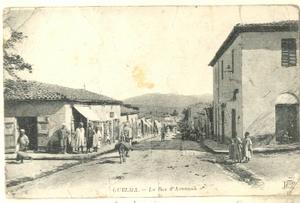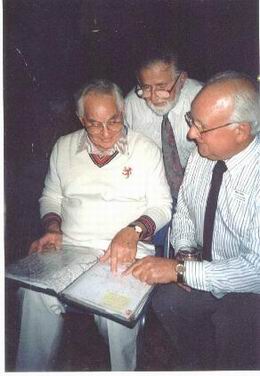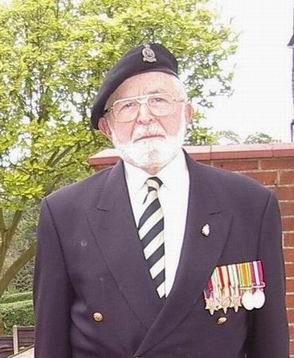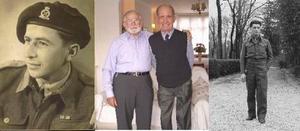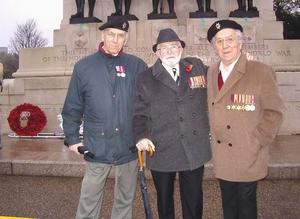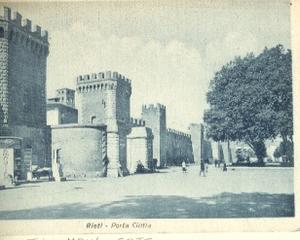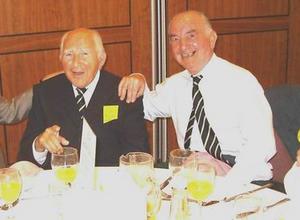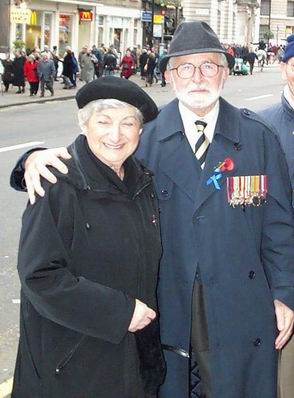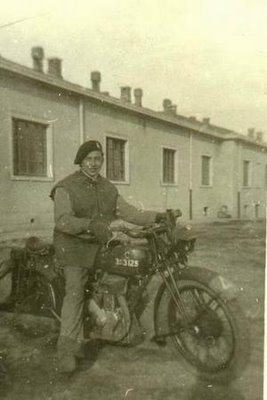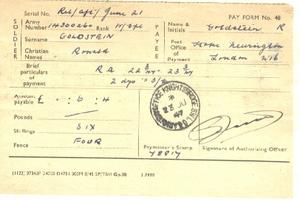
Photo shows: A map of some of my wanderings, courtesy of Ron Tee
On Page 87 of my Army Album I listed all the places I had "visited" during the period I spent in the Army and this is duplicated below:
Oct ’42 Bury St.Edmunds Army Training Unit
Nov ’42 Whitby, Yorkshire Royal Artillery
Feb ’43 Haltwhistle, Northumberland
March ’43 Hove, Sussex
Congleton,Cheshire
Woolwich, London
April’43 Liverpool
S.S.Frankonia (The ship that took us to North Africa)
Algiers, North Africa (49th Light Anti Aircraft Unit)
Cap Matifou
Ghardimeau
Medjes El Bab, Tunisia
June ‘43 Carthage
Guelma
Hammamet
July’43 Syracuse, Sicily
Bronte
Adrano
Messina
Sep’43 Reggio di Calabria, Italy
Crotone
Bari
Foggia
Termoli
Dec ’43 Carovilla
Cantalupo
Agnone
Riccia
Campo Basso
Bagnolia
Feb ’44 Ortogna
Mignano
Cassino
Caserta
Naples
Afragola
San Vittorio
Apr’44 Vanairo
Vanafro
Ceprano
Lake Trasimeno
Rome
Baschi
Tiber
Frosinino
Taranto
S.S.Empires Pride (The ship that took us to Egypt)
Jul’44 Alexandria, Egypt
Cairo
Ishmalia
Amiryah
S.S.Homer Lee (The ship that took us back to Italy)
Augusta, Italy
Assisi
Vasto
Termoli
Sangro
Pescara
Scarperia
Florence
Firenzuolo
Oct ’44 Sienna
Tavernelle
Naples
Ancona
Rieti (Royal Armoured Corp Training Depot)
Dec ’44 Gubbio
Ravenna (4th Queen's Own Hussars)
Rocciano
Rimini
Commachio
Traversare
Ferrara
Lugo
Santerno
Reno
Venice
Ferndorf, Austria
Lienz
Spittal
Jul ‘45 Paternion
Grafenstein
Trieben
Villach
Velden
Klagenfurt
Salzburg
Munich, Germany
Ulm
San Giorgo
Udine
Milan
Brig
Calais, France
Nov ‘45 Folkestone, England
London
Jun’46 Trieste
Monfalcone
Milan
Dieppe, France
Dover, England
London
Dover
Dieppe, France
Trieste
Milan
Calais, France
Dieppe
London
Barnard Castle
York
I've always been what used to be known as a "belt & braces" man, in other words I've always tried to see that I always had backup of info I've posted on the internet and, more importantly, when dealing with the BBC
With that in mind, what follows are all the articles I posted on the BBC site between October 2003 and January 2006, with a description of any image posted to head the article.
Some of the articles were posted on behalf of others and these are marked thus *.
INDEX OF STORIES (IMAGE ATTACHED)
1. Day Leave in Rome (Ron with pipe & KDs)
2. Not My Worst Night, By Any Means: A Young Soldier in North Africa (Ron with 78 Div Flash)
3. Diary Entries 11th April 1945 (Page from Ron’s diary)
4. One family, Five Sons, All Serving in H.M.Forces (Montage of Lou, Jack, Mossy, Mick & Ron)
5. The War Ends in Italy, 2nd May 1945 (Ron on guard at Ferndorf in Austria)
6. Running a Staging Camp in Germany, August 1945 (Page from my Album of Ulm in Germany)
7. Training To Be A Driver/Wireless Operator (Ron’s first Army picture in 1942)
8. Danke Herr Mix! (German Army unit marching through Trieben 1936 & Ron’s billets)
9. My Welcome Home (Ron on train coming home on leave)
10. A Driver/Op in Light Ack Ack (Army Wireless Set No.19 as used by Ron)
11. Getting your Army Records (A page from Ron’s Army Records)
12. Ron's Grand Tour (Map showing Ron’s travels)
13. Trieste, October 1945 to January 1947 (Ron on Minesweeper in Trieste Harbour)
14. Early Army Days, October 1942 (A page from Ron’s AB64 showing innoculations)
14. Two Weeks in Dock in Naples and Not a Wound to Show for it! (Cover of Ron’s Army Album)
16. Monte Cassino, March to May 1944 (Lew Fox & Cover of Cassino Passover Service leaflet)
17. German Propaganda Leaflets Meet (Charlie the Gunner leaflet)
18. What did you eat in the War, Daddy? (Dining hall at Opicina)
19. Joining the 4th Queen's Own Hussars (Group photo of "A" Squadron at Ferndorf)
20. VE Day, As Seen from a Field near Venice (Ron & the clock tower at Venice)
21. The Day My Brother Mick Nearly Killed Me (Ron & Mick on AJEX Parade 1992)
22. Sicily, Then On To Italy (Ron in Bari)
23 Duplicate
24. Waiting to be called up (Ron, Jack, Lew, Dad in the Factory at Gt.Eastern St.1942)
25. Keeping a Diary in Wartime:4th Queen's Own Hussars in Italy and the 49th LAA in Egypt
(Page from Diary dated 16th August 1944)
26. The Day I Should Have Died:4th Queen's Own Hussars in Italy
(Page from Diary April 15th 1945)
27. The 78th Div Goes to Egypt to Re-Train and Re-Form (Ron’s leave in Cairo,including camels)
28. Life in Wartime Austria: 4th Queen's Own Hussars July to August 1945 (Ron with German truck)
29.Transformation from Gunner to Trooper (Pete Burns, Ken Atkinson & Ron at Rieti)
30. Army Transport (Ron as Despatch Rider at Opicina)
31. Stick it in your Army.....Album! (Montage from Ron’s Army Album)
32. The First Post-War New Years Eve, December 31, 1946 (Ron and the fair at Monfalcone)
33. * Jack Nissenthall- The VC Hero Who Never Was: Part 2 (By Martin Sugarman)
34. * No.3 (Jewish) Troop, No.10 Commando (By Martin Sugarman)
35. * Two Jewish Heroines of the SOE Part 1 (By Martin Sugarman)
36. * Two Jewish Heroines of the SOE Part 2 (By Martin Sugarman)
37. * Two Jewish Heroines of the SOE Part 3 (By Martin Sugarman)
38. * Two Jewish Heroines of the SOE Part 4 (By Martin Sugarman)
39. * A Jewish Hero in the SOE Part 1 (By Martin Sugarman)
40. * A Jewish Hero in the SOE Part 2 (By Martin Sugarman)
41. * Jack Nissenthall - The VC Hero Who Never Was (Part 1a) (By Martin Sugarman) Jack N.
42. * Jack Nissenthall - The VC Hero Who Never Was (Part 1b) (By Martin Sugarman)
43. 1939-1947, an ‘interesting’ experience and my 15 minutes of fame. (Nita & Ron - AJEX Parade 2001)
44. Riots in Trieste, circa October 1945 (The riots)
45. Day Leave in Alexandria (Bob Dunne & Ron at Rameses Square-Alexandria)
46. Charlie 4 Is Not Answering My Signals (German Propaganda leaflet-Churchill without Roosevelt)
47. Getting the facts right (Leave pass to Florence)
48. Dive Bombing in Italy - A Memory Confirmed (Larry with friends)
49. Collapsible beds (Ron in tanks coveralls at Rieti)
50. Keeping Clean on Active Service (Ron at swimming pool-Heliopolis)
51. New Years Day 1944, Snowed in at Carovilli (Aerogram sent to Mick from Italy)
52. Images of Wartime, 1939-1946, Ron Goldstein's personal collection No picture attached
53. Ice cold…. But NOT in Alex ! (Ron walking in Trent Park in the winter)
54. Gunner Burnard and the Brigadier (Larry and his friends at Congleton)
55. Return to Cassino (Ron at Cassino British Cemetery)
56. German ‘Tip and Run Raiders’ over Hove in 1943 (Another page from Ron’s War Records)
57. Cambridge and Bethnal Green Boy's Club, The club that produced heroes (Mick & Don Carlton)
58. Lt.Whitfield's directing debut (Another pic of Ron on day leave in Rome)
59. Ron Goldstein’s War — A month at a time (Ron at Horseguards 2004)
60. * Jack Goulden and the prayer book that saved his back (Jack Goulden)
61. Commemoration Parade July 10th 2005 (Nita & Ron)
62. The St.John's Ambulance Brigade in WW2 (Alf, Nat & Sylvia in St.Johns uniform)
63. Lt.Whitfield and the butterfly spring (Ron’s sketch of the 15cwt Bedford wireless truck)
64. Trieste had its funny moments (Ron on steps of Goldoni Tunnel-Trieste)
65. * Field Marshal Keitel's surrender, Nathan Sterrie’s story, (Surrender document)
66. Sweating on being released (Tom Atkinson and the boys at Opicina)
67. Churchill and Ron enjoy a meal together (Regimental reunion official photo)
68. Victory Celebrations, 8th June 1946 (The page from Ron’s Album)
69. A tribute to Edward Arthur Patman, known as ‘Pat’ (Pat & Ron by the Rialto- Venice)
70. Shows running in London during 1945 Page from Ron’s Album showing shows in London
71. Keeping Pets in the Forces (Queenie & Curlie on half-track)
72. The correct height of Tank Drivers and the use of KRRS (Postcard of the Walls of Rieti)
73. * Childhood (Sandra’s story) (Sandra)
74. Commandeering billets in Italy (78 Div Flash)
75. Army Ration Allowance (Two Day’s ration allowance-the receipt)
76.* Bernard Jaffa's Record of Service (Bernard Jaffa & the flag)
77. The infamous Demob Suit (Ron wearing his demob suit)
78. Dale Carnegie’s “Pursuit of Happiness”, courtesy of Stalag XVIII (Page from Ron’s Album)
79 * Evacuated to Stoke Hammond, (Maxie Lea)
80. Looking back to 1939 from the relative safety of 2005(Cyril,Ron & Lew Fox on AJEX parade 2004)
81. * The day a V2 Rocket hit Tottenham Grammar School (Harry Landsman’s story) No picture
82. An Army Convoy On The Move in Italy (Army Route Card)
83. Civil Police in Trieste during the unrest (Italian policeman in Trieste)
84. A postcard from Sicily, 3rd September 1943 (Postcard sent by Ron from Messina 1943)
85. Algiers, April 1943, Our first sight of Africa (Postcard of Algiers)
86. Sgt.Major Mick Goldstein, Royal Fusiliers and Jewish Brigade (Mick)
87. An unlikely Post War meeting (Ron & Tom Canning)
88. A letter to an unknown researcher of the year 2056 (Ron ready for a BBC interview March 2005)
89. More on German Propaganda leaflets (River Po leaflet)
90. * Henry Kaye, Flying Instructor (Henry Kaye)
91. The last page in my Army Album (Ron’s first Army photo and the demob suit)
92. Trooper Tom Canning, a photo at last! (Tom Canning)
93. Sgt.Jack Goldstein, RAF Bomber Command (Alf White, Ted Hull & Ron at 116 Sdrn Reunion)
94. The infamous Burger Brau Keller in Munich (Paddy O’Brien, Lt.Walmsley in Munich)
95. Dining out in Guelma, North Africa, 1943 (Postcard of Guelma,North Africa)
96. WW2 RESEARCH AND FORUMS AFTER THIS SITE CLOSES No picture attached
97. The photo in a serviceman's wallet (Ron’s parents)
98 * .I'll never forget that day, Gertie’s story, (Gertie)
99 * The night our house was sliced in half, Nita’s Story, (Nita as a child)
